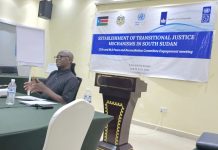By: Kebba AF Touray
A report from the Department of Economic Affairs and Agriculture of the ECOWAS Commission indicates that about 50 percent of the regional population is projected to be food insecure from June to August 2024.
The Commission said this in a report, which was presented before Members of the Sixth Legislature of the ECOWAS Parliament by Mr. Raoul Kouame, Programs Officer for Climate Change at the Directorate of the Environment of the ECOWAS Commission last Saturday, 13 July 2024.
According to the report, climate change will reduce the seasons and water levels, and the working capacity of the agriculture sector could lead to the loss of about 40 percent of pastoral lands. The report unveiled that processing, distribution and consumption will be severely impacted by climate change based on the studies conducted.
“The region is forecasted to have loss of yields in rice in terms if cultivation in low lands including irrigated rice cultivation and rain fed agriculture. All of these will be impacted negatively,” the report revealed.
According to the report, the ECOWAS Region accounts for about 400 million inhabitants out of which 55 percent live in rural areas, adding that the Agriculture sector accounts for about 30 percent of the GDP of the ECOWAS Region, with a working population of about 60 percent, including rapid urbanization.
According to the report, West Africa is a dynamic region with 10 out of the 15 Member States recording an average growth of 5% in terms of their GDP, between 2016 and 2019
The report however unveiled that within the region, over 40% of the population still live in extreme poverty, with a contribution of about 1.8 percent to global emission in terms of GHG, meaning that the region is vulnerable to climate change.
As highlighted by the report, this means that temperatures are rising in West Africa and that these can have negative effects on the various sectors of the economy of the region.
In view of this situation, the ECOWAS Commission’s report disclosed that it has carried out several initiatives in the agriculture sector, adding that climate change is a natural phenomenon that causes the earth to warm up. The report said this started during the industrial phase of world’s development which saw an increase in greenhouse gases in the world’s atmosphere.
“From 1860 to 2020, the world’s temperature has always been on the increase due to the concentration of greenhouse gases in the atmosphere, causing the warming of the planet,” the report said.
The report further indicated that “from 2015-2020, green vegetation has dissipated more and more; that from 2015-2018, the region’s forest cover has reduced severely, projecting a negative impact for West Africa in terms of loss of human lives due to inadequate health services, reduction in economic growth and possible issues of water supply.
The Commission’s report thus recommended that efforts should be made towards a reduction in temperature up to more than 1.5 percent.
The report added that in view of the impact of Climate Change especially on the agriculture sector, the ECOWAS Commission is carrying out many actions through the governance of strategic documents which include the ECOWS Environment Policy Document (ECOWEP 2008); ECOWAS Regional Climate Strategy and Action Plan 2022-2030; ECOWAS Regional Climate Strategy-2022-2030 Action Plan, and the Regional Food Security Storage Strategy.
The report stated that the Commission has developed and adopted policies, strategies, programs and projects in favor of the climate and agriculture, and stressed the need for the Regional Parliamentarians to play key roles in strengthening laws and instruments needed to combat climate change.





















